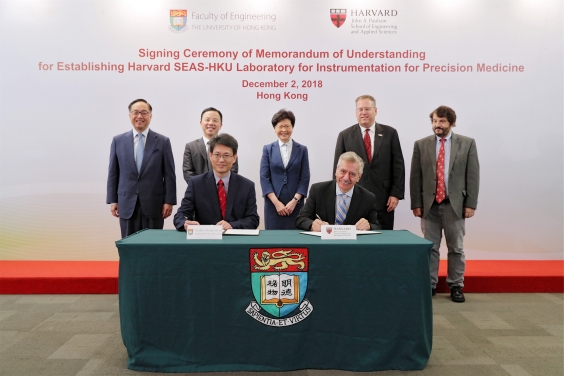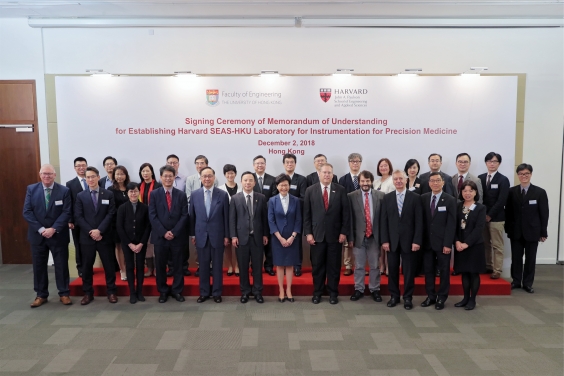The Faculty of Engineering at the University of Hong Kong (HKU), and the Harvard John A. Paulson School of Engineering and Applied Science (Harvard SEAS) signed a Memorandum of Understanding (MoU) today (December 2) to set up a Laboratory for Instrumentation for Precision Medicine.
Professor Christopher Chao, Dean of Engineering of HKU and Dr. Fawwaz Habbal, Executive Dean for Education and Research, Harvard SEAS officiated at the signing ceremony.
The event was witnessed by The Hon Mrs Carrie Lam, the Chief Executive of the Hong Kong Special Administrative Region (HKSAR); Mr Kurt W. Tong, Consul General of the United States to Hong Kong and Macau; Professor Zhang Xiang, President and Vice-Chancellor of HKU; Mr Nicholas W Yang, the Secretary for Innovation and Technology of the HKSAR Government; and Professor David Weitz, Mallinckrodt Professor of Physics and Applied Physics, Harvard SEAS.
HKU Faculty of Engineering and Harvard SEAS aim to establish a laboratory focused on medical instrumentation for microfluidic-based diagnostics, drug delivery and sensor development in the age of precision medicine, in response to the HKSAR Government’s initiative to turn Hong Kong into a global hub of innovation and technology, particularly in the areas of healthcare technologies.
The Hon Mrs Carrie Lam, Chief Executive of the HKSAR, said: “The HKSAR Government is committed to attracting world-leading research institutions to conduct collaborative research. The signing of the MoU between the HKU Faculty of Engineering and Harvard SEAS, which signifies enhanced collaboration and cross-fertilisation in the research area of precision medicine in Hong Kong, is a very significant step in this endeavour. I wish the two universities great success in the collaboration.”
U.S. Consul General Kurt W. Tong said: “The U.S. Consulate General welcomes this important and positive milestone in U.S.-Hong Kong science and technology cooperation.”
“Today’s memorandum brings together two universities that are known and respected around the world for our commitment to pursuing world-class, pioneering research,” Professor Xiang Zhang conveyed in the ceremony.
Precision medicine (PM) is an emerging field of research by scientists. Innovation and technological development in the area will open up a new paradigm in healthcare leading to the customisation of healthcare, with medical decisions, treatments, practices, or products being tailored to individuals.
The Laboratory will be organised into themes based on technologies that HKU and Harvard SEAS are pioneering and share interests and competitive edge in, such as microfluidics, drug formulations, sensors and detectors.
Dr Fawwaz Habbal expressed that “HKU has excellent educational programs and first class research capabilities. Our collaboration will enable the talented engineers and scientists in both Universities to create significant innovative instrumentations for precision medicine, and will facilitate the design of devices and treatments that will impact health care across the world.”
Professor Christopher Chao, Dean of Engineering of HKU, commented that “the signing of MoU is the first but promising step forward for the two institutions. It is expected that by joining the strengths of the two academia, a strong platform will be built for translating fundamental breakthroughs and more synergistic activities will be conducted for the advancement of healthcare-related technologies that can lead to strong technology transfer value and societal impact.”
In the coming months, HKU Faculty of Engineering and Harvard SEAS intend to submit a proposal to the HKSAR Government under the recently announced Health@InnoHK research cluster initiative, with a plan to establish a research laboratory in the Hong Kong Science Park.
More about the Partnership and the Laboratory The focus of the Laboratory will be instrumentation for diagnostics, drug delivery and biosensors in precision medicine and other healthcare-related areas. The Laboratory will be organised into themes based on technologies that HKU and Harvard SEAS share interests and competitive edge in, such as microfluidics, drug formulations, sensors and detectors. The Laboratory will provide a platform for translating fundamental breakthroughs and advances into commercialisable ideas. The strengths of Harvard SEAS and HKU will be harnessed to breed innovation, creativity, new translational developments and new high tech jobs in Hong Kong.









Comments